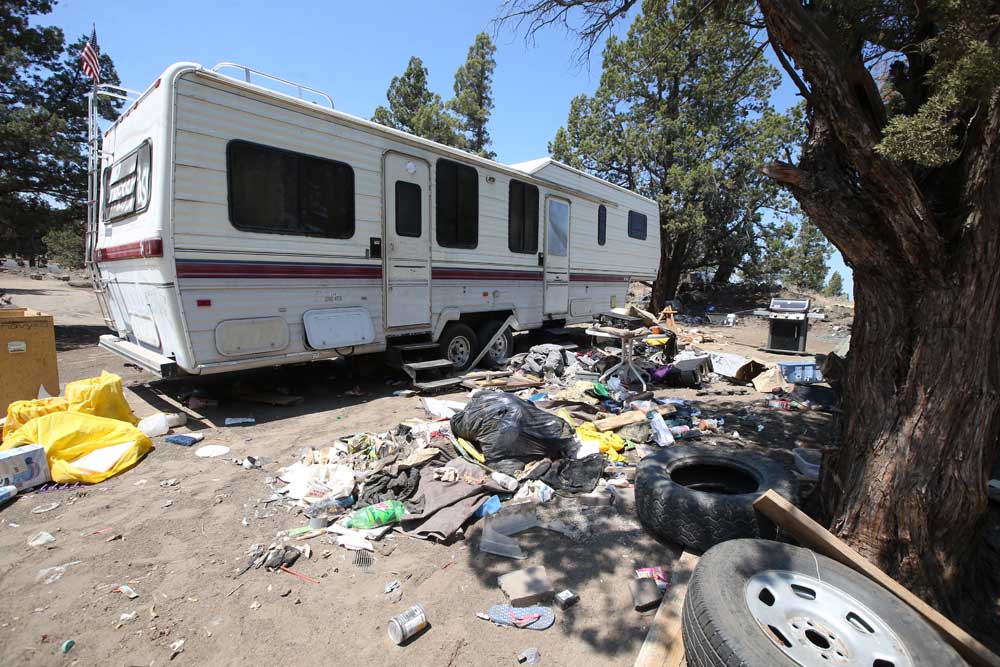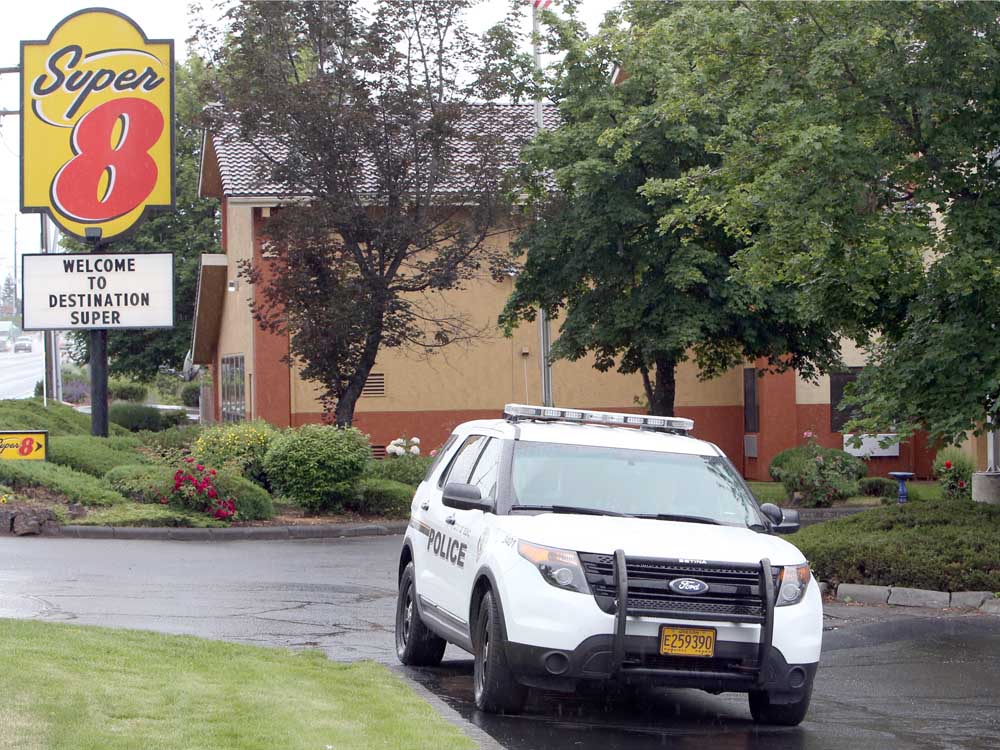Deschutes County commissioners clash over future of homeless camps
Published 5:45 am Friday, July 26, 2024

- Rotting garbage litters the ground outside a trailer in the Juniper Ridge area north of Bend on Tuesday afternoon.
A U.S. Supreme Court ruling last month gave Deschutes County the green light to enforce its camping code and dictate where unsheltered people can live on county-owned lands.
But Deschutes County commissioners don’t see eye to eye on how to proceed.
Commissioner Tony DeBone said in a Monday meeting he wanted to take action with the code and create new camping areas.
Commissioner Phil Chang disagreed, saying that wouldn’t go far enough to help people out of homelessness.
Commissioner Patti Adair said the pressure is building on the county to address unmanaged camps.
More transitional shelters are on the way — but only enough to serve part of Deschutes County’s homeless population.
Deschutes County is hoping to address unsanctioned camping primarily in three areas: Juniper Ridge, a swath of High Desert owned by the county and city of Bend along U.S. Highway 97; an area east of Redmond; and on federal lands southeast of Bend and near La Pine.
Its rules against camping apply only to county lands.
Deschutes County passed a new code one year ago restricting overnight camping and other related activities on county-owned or county-controlled land.
Oregon state law mandates that any camping code be “objectively reasonable” as to how people without shelter are forced to leave their camps. The current county code was crafted with that restriction in mind, said Dave Doyle, chief legal counsel for Deschutes County.
Because of the Supreme Court’s decision in Grant’s Pass v. Johnson, Doyle said he believes the camping code could withstand a legal challenge to an attempt to remove or arrest people from where they are camping on public lands — as long as people are provided a place “as good or better than where you are having them leave from,” because of the state law.
The Supreme Court said that camping bans do not violate constitutional protections against cruel and unusual punishment.
Doyle said the process of forcing people from unsanctioned camps, from eviction notice to arrest, could take four months.
“But you have the right to do that. The Supreme Court has clearly said you have that right,” Doyle told commissioners.
Living with uncertainty
Tom Cheney, 68, began living in a motor home at Juniper Ridge a few months ago. He gets rides from a friend into town to get to his job at a convenience store in west Bend.
He became homeless two years ago and since then has lived in a car near the center of town, but Juniper Ridge is the only place where he’s not bothered by law enforcement, he said.
He said he wishes the encampment was cleaner. But he would be reluctant to move again if he were forced away from Juniper Ridge, he said.
Citing health and safety concerns, local governments have removed people from homeless camps in Bend on a handful of occasions in the past several years.
The most recent data shows about 1,800 people are homeless in Central Oregon, and 1,200 of them are living without shelter. That number grew by nearly 10% from 2023.
Service providers and outreach workers estimate that anywhere from 100 to 200 people live in the Juniper Ridge area.
In August 2023 Deschutes County made a plan to remove people from Juniper Ridge, and brought toilets, water and dumpsters. The Supreme Court had recently decided to take up the Grants Pass case. The county put enforcement on hold.
Leaning into the camping code
DeBone told commissioners on Monday he wants to “lean in” on the camping code. He suggested the county make a “real clear decision” about where camping is allowed and set up two designated camping areas, one at Juniper Ridge and one east of Redmond, near where camps already exist.
Grants Pass case gives Central Oregon lawmakers confidence in camping bans
DeBone said the camping areas could be something similar to the Bureau of Land Management’s “long-term visitor area” model for camping on public lands, with regulations and “community norms.”
Given that option, people currently camping at Juniper Ridge or east of Redmond could be asked to leave from unsanctioned camps, DeBone said.
“It’s not done with vengeance or anger,” he said. “This is helping people that are living in a pretty rough situation.”
He urged swift action, pointing to winter weather coming down the line and a pending land swap between the county and the Oregon Department of State Lands.
As part of a decade-old agreement, the county hopes to trade 137 acres of land east of Redmond for 140 acres near the Deschutes County Fairgrounds to complete an expansion there.
But the state lands department told the county in 2022 that the deal couldn’t go forward until the county removed homeless camps from the area.
Juniper Ridge residents prepare for county, city plans to remove them
Another 45 acres of county-owned land directly to the east, within the city limits of Redmond, could be developed as an alternative site for people currently residing on the acres involved in the swap, said Erik Kropp, deputy administrator for Deschutes County.
At a board meeting on July 29, county commissioners will discuss several concepts for what kind of services could be provided there, Kropp said.
Potential solutions in the works
Even with the assured authority over camping on county lands, Chang said the county’s task in addressing homelessness is the same as it was before the high court’s ruling — the county needs to create more opportunities for people to exit homelessness, he said.
Chang believes that needs to be accomplished before removing more people from unsanctioned camps.
The county allocated $1.5 million earlier this year for outdoor homeless shelters. The staff and board of the regional Coordinated Houseless Response Office is evaluating a handful of proposals, including safe parking areas, a tiny-home village and expansion of Redmond’s Oasis Village, transitional housing with services.
La Pine residents tell Bentz curtailing homelessness will prevent another fire
One proposal from the Home More Network, a homelessness nonprofit, requested $1.7 million to create a managed camp at Juniper Ridge to monitor residents and provide services on site. But the regional office was hesitant about the proposal, Kropp said.
“The reason it wasn’t recommended was because it was a large proposal from a relatively new non-profit that has not done a similar project,” he said in an email. “The feedback to the non-profit was to work on a smaller scale proposal, which they are.”
La Pine residents tell Bentz curtailing homelessness will prevent another fire
Central Oregon governments recently received notification of a $1.1 million award from the governor’s office for shelter pods. The money could also contribute to the managed camp proposals.
It would complement hundreds of shelter beds in Bend.
The projects are a starting point, Chang said. But they would need to be scaled up to match the size of the problem, he said.
Clearing homeless camps without those solutions in place would be an ineffective response to homelessness, he said.
“I’m not willing to voice support for just shuffling people from one unauthorized place to another,” he said.
Meanwhile, people living at Juniper Ridge rely on help from service providers and outreach workers, including Frank Struptih of Central Oregon Veterans Outreach. The group makes weekly trips to Juniper Ridge and around China Hat Road, a large unsheltered camping area on federal land southeast of Bend, delivering food, water and picking up trash at each encampment.
“If we can get out of the mindset that we can end homelessness and just face the reality of managing it, I think we would do better off,” he said.






